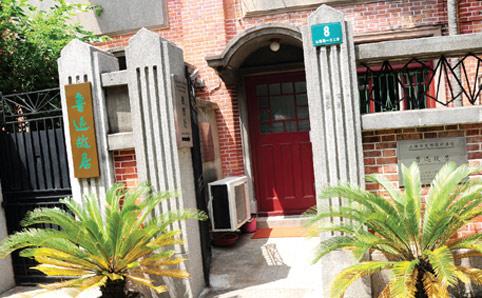Royal Asiatic Society Shanghai – Lu Xun Day – 22/5/16
Posted: May 18th, 2016 | No Comments »1:00 pm – 9:00 pm
Lu Xun Day
SCHEDULE OF EVENTS
1:00 pm – 3:30 pm, WALK: LU XUN AND FRIENDS IN SHANGHAI, meeting place TBA
4:30 pm – 6:00 pm, DISCUSSION: THE STORY OF A-Q, Chai Living Lounge
6:30 pm – 9:00 pm, FILM: “NEW YEAR SACRIFICEâ€, Chai Living Lounge
Three-part event. You may register for any one or two parts, or for all three parts.
Members, priority “Walk†registration through Wednesday, May 18. (Click here download membership application)
When registering, please indicate which event(s) you plan to attend. Please indicate if you wish to apply for or renew RAS membership.
RSVP bookings@royalasiaticsociety.
Lu Xun (1881-1936) is one of the greats of 20th-century Chinese literature. He was celebrated during and since his lifetime for his powerful diagnoses of his nation’s social and political crisis, and for his pioneering achievements in reinventing the vernacular as a literary language.
Despite his public commitment to Marxist literary ideals and his posthumous canonization by Mao Zedong, Lu Xun’s final years were spent mired in squabbles with the Chinese Communist Party’s representatives of ideological orthodoxy. When he died he bequeathed to modern Chinese letters a contradictory legacy of cosmopolitan independence, polemical fractiousness and anxious patriotism that continues to resonate in Chinese intellectual life today.
The Walk: Lu Xun and Friends in Shanghai From October 3, 1927, until his death October 19, 1936, Lu Xun lived in an area just outside Shanghai’s International Settlement but not quite within the jurisdiction of bordering Chinese administered Zhabei District. It was a political no man’s land making it a relatively safe place for left-wing activists to live and assemble. We will walk the streets Lu Xun walked, see some of the places where he and his fellow activists lived and met, and explore how, despite squabbles with the CCP during his lifetime, how he came to be one of its icons. (The house museum where he lived and died is temporarily closed for renovation). The area is in a part of Shanghai that at the time was heavily Japanese. During the walk we will see traces of its “Little Tokyo†past.
The Discussion: The Real Story of Ah-Q (阿Qæ£ä¼ ) is a novella first published as a serial between December 4, 1921 and February 12, 1922. Written after the May 4th Movement (1919), it is among the first pieces of Chinese literature written fully in the vernacular. In the story Ah-Q is continually defeated by his fellow lowlifes, by respectable people and by revolutionaries. Yet in his mind he turns each situation around into a moral victory. The work is generally held to be a masterpiece of modern Chinese literature.
The Film: New Year Sacrifice (ç¥ç¦), 1956
Directed by Sang Hu, Starring Bai Yang, Li Jingbo, Wei Heling, Guan Zhongqiang, Shi Lin, Screenwriter: Xia Yan, based on a story of the same name by Lu Xun, Cinematographer: Qian Jiang, Beijing Film Studio production
Linda Johnson, RAS Film Club convener, will introduce the film. This 1956 film version of the 1924 short story, a classic of revolutionary realism, was made as a commemoration of Lu Xun’s death 20 years before. It was the first film adaptation by Xia Yan in his new role as Deputy Minister of Culture. Many prominent filmmakers in China in the new Peoples’ Republic had been part of the May Fourth generation of artists and turned to literature of that period as a source for adaptations to mass culture. Xia Yan (1900-1995), arguably the most successful leftist writer in drama circles in Shanghai in the 1930’s and ‘40’s, was one such scriptwriter and he is seen here making dramatic changes to the narrative voice of the story, and to its content, to make it suitable for the mass culture of the day.
In Yan’an during the Sino-Japanese War Mao Zedong made it clear that the writings of the May Fourth ‘petit bourgeoisie’ had little connection with the Communist cause and directed writers to address wider concerns and wider audiences. As a result, the more complex, often ironic narrative styles were replaced with more traditional forms of storytelling and ambiguities in storylines were replaced with strong certainties. The director, Sang Hu, and his team of top ranking actors had also been prominent in pre-1949 Shanghai film, and this becomes evident in the quality of the performances and the attention to detail in the film.
The popularization of this story for the film version did not simply turn it into propagandist fodder for the masses, but produced a temporarily politically acceptable film, which appealed on a number of levels to both urban and rural public. It was an instant and widespread success, making the story a household name. Brilliantly portrayed on screen by Bai Yang (1920-1996), the character Xianglin’s Wife finally brought the feminist critiques of China’s patriarchal society by the New Culture Movement to a largely illiterate mass audience.
While it is not essential to have read the story before seeing the film it is interesting to see the type of adaptations made to popularize the story. The story is very short and can be found online at https://www.marxists.org/
ENTRANCE
Walk Members RMB 100, non-members RMB 200
Discussion Complimentary for members and non-members joining walk, non-members RMB 50
Film Complimentary for members and non-members joining walk and/or discussion
VENUES
Walk Meeting place provided on acceptance of RSVP
Discussion and Film Chai Living Lounge, 410 North Suzhou Road, near Henan Middle Road虹å£åŒºå®¿å·žåŒ—è·¯410å·
Tiantong Road Metro Station, Lines 10 and 12




Leave a Reply